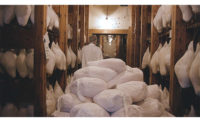An Italian tradition on Chicago’s west side
One of the rising stars of Chicago’s culinary world runs the only USDA salumeria in the city.

While West Loop Salumi hits many of the trends that are gaining in popularity among consumers — simple ingredients, locally sourced, artisan craftsmanship — Laketek isn’t driven by being a trendsetter.

Since coming into the meat industry, Gregory Laketek and West Loop Salumi have been praised by Forbes, Zagat, Food & Wine magazine and many other publications.

West Loop Salumi has gained an impressive number of foodservice customers throughout the country since the company started in 2013.

West Loop Salumi’s products dry under strict conditions to ensure their quality. Its pancetta has dried for two years, and its culatello and coppa are not far behind.






Gregory Laketek didn’t enter into the world of meat processing to find a job. He already had a job, working as a consultant to the defense industry, but he was burned out and dissatisfied by it all. What he wanted was a career.
“What was I going to do for the rest of my life?” he asked himself. “Where I would be happy and look forward to going to work every day?”
Out of all the possible opportunities for a young, intelligent, hard worker, Laketek ended up thinking back to the childhood summers that he spent in Italy. Specifically, the occasions when the family would gather, slice up bread, cheese and delicious Italian meats and just enjoy one another’s company. Those memories started him on a journey that led to an apprenticeship under one of the top salami makers in Italy, a return to the United States and the creation of the only USDA certified salumeria in the city of Chicago. Laketek’s company, West Loop Salumi, has developed an impressive customer list after a short time in operation, and Laketek has been recognized several times as a leader in Chicago’s under-30 culinary scene.
“We’ve only been processing for two and a half years, and we have over 300 clients nationwide,” he says. “We have been given so many great accolades, and without a press team or a sales and marketing team, it’s a great feeling.”
While West Loop Salumi hits many of the trends that are gaining in popularity among consumers — simple ingredients, locally sourced, artisan craftsmanship — Laketek isn’t driven by being a trendsetter.
“It wasn’t to be trendy or to say that I needed to fill a niche or a need, other than the need of my own happiness. That’s what West Loop Salumi became, a place where I can come in [and be happy while I work]. We have Surround Sound in every room, and we just all get together every day and process.”
Laketek and his three employees utilize the traditional Italian methods of processing, wherever possible. The team ties the products by hand instead of using netting, and they don’t use shortcuts to ferment any products, because modern methods create different flavors within the meats. The surround sound in the production area is a modern touch, as is an automated drying room that was designed by a pharmaceutical lab supplier. Aside from the few nods to modern technology, time and care are the primary processing aids.
“It was something that didn’t need to have a lot of processing to be delicious, but the quality had to be there,” Laketek recalls about the Italian meals from his youth that left such an impression. “That’s why we try to get the best quality of ingredients that we can and let it work, give it time to actually develop the flavors, sort of like a fine wine.”
West Loop Salumi, unlike many other companies, does no advertising, has no marketing team or PR agency, and doesn’t even have a sign in the front of its building. Its customer base has grown largely through word-of-mouth and recommendations from the chef community. The meats — culatello, coppa, pancetta, soppressata and ‘nduja, to name a few — are in high demand on many menus of leading restaurants — not just in Chicago, but throughout the United States.
“Our culatello is on a reserve list, so we’ll only sell culatello to the clients that have been waiting for it,” Laketek says. “It’s our most profitable but our most time-consuming product to make, because it takes about a half hour to process and then a minimum of 14 months before we release it. There are no nitrates at all, so because of that, we need to take a lot of time and care to make sure everything is done properly. If the femoral artery isn’t bled properly, then blood will stay inside the ham, and you’ll have molding from inside the product.”
A leap of faith pays off
Laketek says that his trip to Italy was largely unplanned. Rather than research the names of the largest meat processors in Italy, he bought a one-way ticket to Parma, the region of Italy most known for its fine meats. From there, he walked the streets and talked to people at delis and salumerias about learning the craft.
“It was about two weeks that I was there, and I began thinking, ‘What am I doing? What’s my plan? I can’t just sit here every day and not have progress,’” he recalls.
He eventually learned of Massimo Spigaroli, who was a renowned master of culatello — similar to prosciutto, but boneless — and other cured meats. He and his family had a nearby castle that included a hotel and restaurant. Intrigued, Laketek made a reservation for dinner at the restaurant and asked if he could get a tour of the facility as well.
During the tour, he was introduced to Spigaroli and explained that he wanted to open the first salumeria in Illinois.
“He was astonished that there are no salumerias in Chicago, because in Parma, there are probably over 100. Every city has a good 10-50 of them,” Laketek says.
Laketek was dropped into the processing room the following Monday. He was surrounded by employees who didn’t speak English, and he didn’t speak Italian, but they were able to establish a degree of communication through visual cues and occasional yelling, Laketek jokes. He spent eight months in Italy, working 12-hour shifts and learning the traditional methods for making fine Italian cured meats.
Once his training was completed, Laketek headed back home to Chicago to look for a place to put his education into action. He found a small building for rent, and thanks to his training and the USDA’s support, he was able to configure the production area to his needs. While West Loop Salumi meets all the critical control points required by food safety rules and regulations, the company still is able to utilize traditional processing methods. Of course, drying time for meat becomes very important. Whole-muscle pork products do not dry for less than four months.
“Our pancetta is at two years right now, our culatello is at 18 months right now, and we have our coppas at 14 months,” Laketek says. “The flavors increase and intensify with age, and the way that ours are encased in the chambers, it’s set to a point that they’re not going to dry out.”
West Loop Salumi accomplishes the same fermenting of the products that other salami makers do, but Laketek and his employees do it according to the Old World traditions. Instead of injecting whole muscles, the company adds enough salt without the use of brines. Instead of fermenting with dextrose or sugar, they use wine. This fermenting process is more time consuming, and requires more attention to detail. Consequently, West Loop Salumi has to charge a premium price for its meats, but that has not slowed the flow of customers.
Through word of mouth, West Loop Salumi’s reputation spread throughout the fine restaurants in Chicago and, now, throughout the country.
“A lot of chefs at hotels had previous jobs or moved around to different hotels, so that’s how we got into the Waldorf Astoria in Boca Raton and Four Seasons in Hawaii, and hotels in Miami and New York. Chefs move around so frequently, and they like to keep up with the sort of niche, smaller places, where they know that can count on quality and that no one else is going to have in the area,” he says.
Instead of relying on a marketing campaign, Laketek says that customers and potential customers frequently come to West Side Salumi to taste products, learn about the process, and understand what makes these meats premium items.
“We want to help them understand, instead of going in and buying something, not really knowing what they’re getting and why it’s so expensive,” he explains, noting those conversations allow him to explain things like product weight loss during the drying process and the hand work that goes into each item. “We want them to be happy and realize that they are getting a bargain, and that they’re getting something special that we worked hard to develop.”
Laketek notes that his cured meats do fit in with the current culinary trends. Diners are looking for simpler options, and they are turning to places that are catchy and fun, and not necessarily high-end. West Loop Salumi’s products work well on a sandwich, but they can be used as an appealing appetizer in a higher-end restaurant as well. Additionally, the meats don’t require much prep work.
“As [restaurant] labor gets more expensive, and rent gets more expensive, it makes more sense just to have ingredients that you can just toss onto a plate,” he says.
West Loop Salumi has had some hiccups along the way. A flood in 2013 wiped out $140,000 in inventory, and a broken sewer pipe earlier this year cost $40,000 in damage, plus time away from processing while the street in front of the building was closed off. Rent continues to increase, as West Loop Salumi’s location has become more desirable.
“It seems like there are so many things against us, but as we build our company, it shouldn’t be such an issue,” Laketek says.
An offsite expansion should help relieve the congestion in West Loop Salumi’s current 1,100 square-foot facility. The company is moving its drying and packaging to a nearby location, which should greatly expand its production capabilities. Instead of dozens of culatello drying at once, there could be hundreds.
“The site that’s being built out there is completely according to the traditional rooms and chambers that they have in Italy, but built with American parts, so if anything goes down, we can go to a local company and get the parts we need for it to get back in action,” Laketek says.
Just because the company uses traditional production techniques doesn’t mean that it is locked into small batch sizes. Laketek says that production can be scaled up without affecting quality; a lack of space was the only thing keeping the company from having done so already.
“As we process more and get our style out there, I want people to think of that when they think of salami instead of some of the other big names out there, where sure, it’s less expensive, but it’s also less expensive for a reason,” he says. “We’d ultimately like West Loop Salumi to become the standard for salumi in the U.S.”
Looking for a reprint of this article?
From high-res PDFs to custom plaques, order your copy today!











